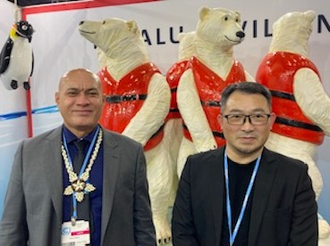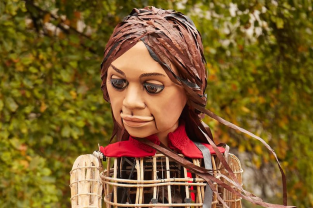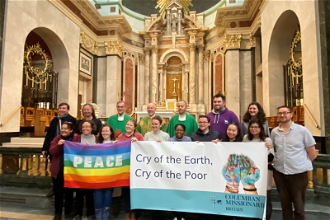COP26 Blog 10: Polar bears in lifejackets

Tuvalu's finance minister Seve Paeniu with artist Vincent JF Huang at the Tuvalu Pavilion in COP26
Today Filipinos are marking eight years since Typhoon Haiyan devastated the Philippines. "We are still living in the same vulnerability, in the same trauma," said a Filipino delegate at the COP26 climate summit in Glasgow this morning.
Typhoon Haiyan was one of the most powerful tropical cyclones ever recorded. With wind speeds of up to 195 mph, buildings in the Visayas were flattened and 6,340 Filipinos were killed. It heralded a new era of this kind of disaster.
The Philippines is an island nation of the Western Pacific where the more severe weather of a warming world will have, and indeed is having, profound impacts.
Philippine Bishop Crispin Varquez of Borongan said today, on the typhoon's anniversary, that since so many calamities are related to climate change, he asked the public "to hear the cry of our planet for common action to save our common home". He urged Filipinos to heed Pope Francis' call for "ecological conversion".
Another nation in trouble is the Pacific island archipelago of Tuvalu, which has one of the most visually dramatic pavilions in the main conference centre of COP26, known as the Blue Zone. It is displaying an art installation of polar bears wearing life jackets standing on melting ice and a penguin strung up beside them. They are the work of Taiwanese artist Vincent JF Huang who was in the pavilion, alongside Tuvalu's finance minister Seve Paeniu, when I visited.
It is easy to presume that country delegates to COP26 are politicians divorced from the frontlines of the climate crisis. But Seve Paeniu was very far from this stereotype. He told all who would listen that "we are living climate change" and feared the fate of his low-lying atoll home and the population of 11,000 people. "Islands are disappearing and we are literally sinking," he said, standing before the exhibit. Huang showed some of his other work. One showed Michelangelo's Pieta beside his Pieta showing a polar bear cradling a dead penguin. Powerful stuff, demonstrating the link between melting icecaps and sea level rise.
Pacific islanders at risk of rising sea levels are struggling to be heard at the climate summit in Glasgow as the COVID-19 pandemic hampers long distance travel. Only three Pacific leaders - of Palau, Fiji and Tuvalu - have travelled to make speeches pressing for deep cuts in greenhouse gases by major emitters led by China and the US. Usually, almost all the leaders of 14 Pacific island states come to the annual talks.
The Glasgow summit is trying to keep alive the toughest goal of the 2015 Paris climate agreement, to limit global warming to 1.5 degrees Celsius above pre-industrial levels. Global surface temperatures are already up 1.2 degrees. Pacific islanders want $750 billion a year in climate finance in the second half of the decade, far above unmet pledges by developed nations to provide $100 billion annually by 2020.
Yet, unfortunately, the fossil fuel industry has a powerful presence at COP26, mostly behind the scenes. In fact, Global Witness reports that if the fossil fuel industry were a country, it would have by far the largest number of delegates - over 500 lobbyists. This is a real problem for a landmark conference that must listen most attentively to the voices of victims demanding urgent climate action.
It is to the credit of the Christian Churches and other faiths that they are lifting the voices of the smaller nations and communities and supporting their call for a just transition and divestment from fossil fuels. This afternoon Operation Noah held an online event from COP26, 'Fossil fuel divestment, climate justice and a just transition for all'. Lorna Gold of the Laudato Si Movement said, "the impact of faith institutions that have divested has been very, very significant…they roughly represent 35 per cent of all institutions that have divested…and Catholic institutions make up a disproportionate number".
The Pacific island nations had powerful support today from former US President Barack Obama. The 60-year-old, who grew up in the US island state of Hawaii, spoke at COP26 to leaders and delegates from Pacific island nations. He described himself as an "island kid" and said the islands are now "threatened more than ever" by global warming. He described island states as the "canary in the coalmine" for climate change, which will suffer the most catastrophic effects of global warming before other countries. Obama ended his speech this morning with a Hawaiian proverb, urging people to unite to move forward. "It's a reminder that if you all want to paddle a canoe you'd better all be rowing in the same direction" he said, "and at the same time, every oar has to move in unison."
LINK
Tuvalu Minister gives COP26 speech knee deep in the ocean - www.cnbc.com/2021/11/08/tuvalu-minister-gives-cop26-speech-knee-deep-in-the-ocean-to-highlight-rising-sea-levels.html


















